27 Company Retreat Ideas Your Team Will Actually Enjoy


For some, the thought of attending a weeklong sleepover with your coworkers sounds like a nightmare full of forced, corny team building activities.
But it doesn’t have to be that way! If you’re in charge of planning your company retreat, you have the opportunity to introduce new team building and leisure activities that are productive, memorable, and most importantly, fun.
So you’re having a company retreat
Planning a corporate retreat that goes beyond a boring, booze-soaked week of R&R on the company dime requires intentionality and attention to detail.
We’ve talked about the logistics of how to plan a company retreat before (Zapier also has a great guide to retreat planning), but once you’ve taken care of the basics, you need to figure out what your team is going to do. This can feel like the most daunting task since you’re trying to exceed your entire team’s expectations, but fear not! It can be done.
After nine company retreats, we’ve learned a lot — for example, people don’t like to be on a bus forever and ever (who knew?!) and prefer only one deep dive talk scheduled at a time, so nobody misses out on any of the brilliant ideas our team members have to share. The surveys we conduct after each retreat have helped us apply that feedback to the planning of future retreats, and our ratings have risen from 8.87 to 9.5 out of 10.
The recipe works. By sharing it, we hope to save you some major headaches.
27 company retreat ideas
When you’re building your corporate retreat agenda, it’s critical to plan for the right mix of business, activities and free time. While talking shop is certainly a priority, the goal of our retreats is to relax and connect in real time. This may sound obvious, but you need to actually schedule opportunities for this to happen.
Work retreats are a rare time when spontaneous moments arise and hilarious memories form. The major reason we retreat is to spend quality time together in a beautiful environment. It’s all too easy in a remote company to stay heads down in our work, so we make a point to schedule plenty of fun time together, too.
1. Get everyone hyped ahead of time
Because we’re a remote company, we can’t build hype about our upcoming retreats during in-office meetings or over the lunch table. So we use video to entice our teammates to start the countdown to retreat time. Retreat teasers are also a great way to highlight a fun feature about your destination. For our Austin, Texas, retreat, I played up the Old West theme. For our trip to Baie-Saint-Paul, Québec, I employed some gentle self-deprecation as I tried to tackle YouTube French lessons.
2. Invite collaboration
Remember you have a wide array of personalities on your team, and they might have fun hobbies or gadgets they’d be willing to bring along to enhance the retreat experience. We’ve had team members bring drones for capturing overhead video, board games they created, and even a deflated soccer ball and travel pump for pickup games.
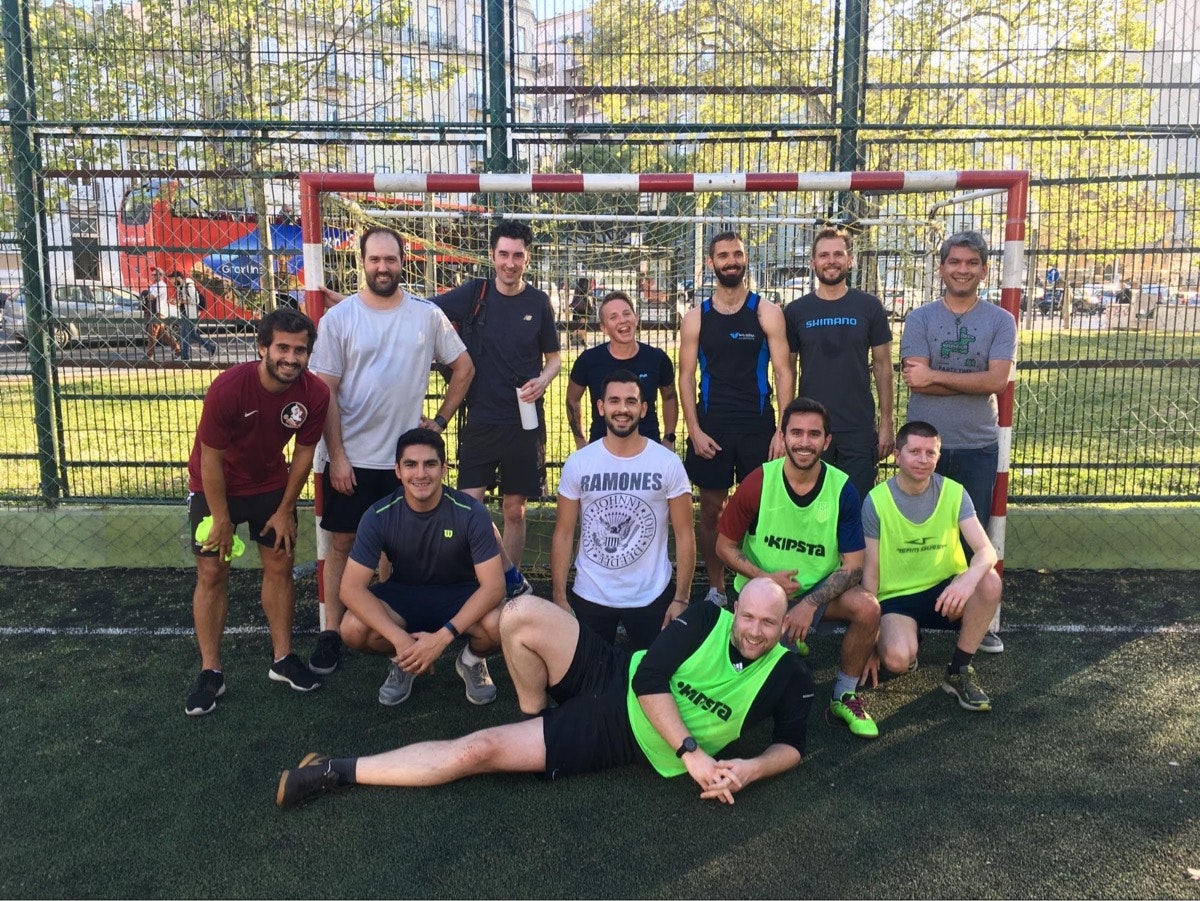
Help Scout’s soccer (or football, depending!) players after a friendly match in Lisbon, Portugal
3. Host a welcome party
Plan for everyone arriving by dinnertime on day one, so you can throw a welcome get-together. It’s a moment when everyone is excited to see each other and to be momentarily done with traveling — the good spirits set a positive tone for the rest of the retreat.
4. Hold an all-hands meeting
We kick off our first full retreat day with our all-hands meeting, which is equal parts pep rally and important business updates. Our CEO talks about where the company stands and our vision for the future, and team leads give big-picture talks about what their teams have been up to and where they’re headed.
5. Take a hike
After spending a few hours in a conference room, it’s invigorating to connect with nature (and each other!) on the trails.
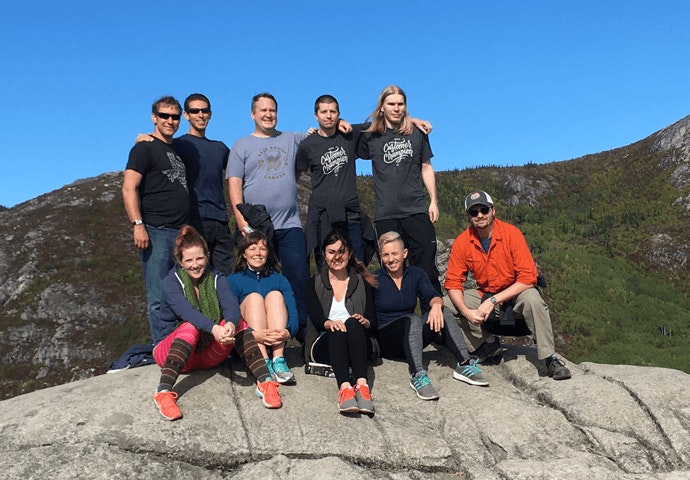
Some adorable Scouts take a hike in the hills of Québec.
6. Row, row, row your boat
Chances are, wherever you’re traveling, there’s a body of water nearby — and an outfit ready and willing to rent out kayaks, stand-up paddleboards, canoes, surfboards or other equipment for getting on the water and seeing things from a beautiful new perspective.
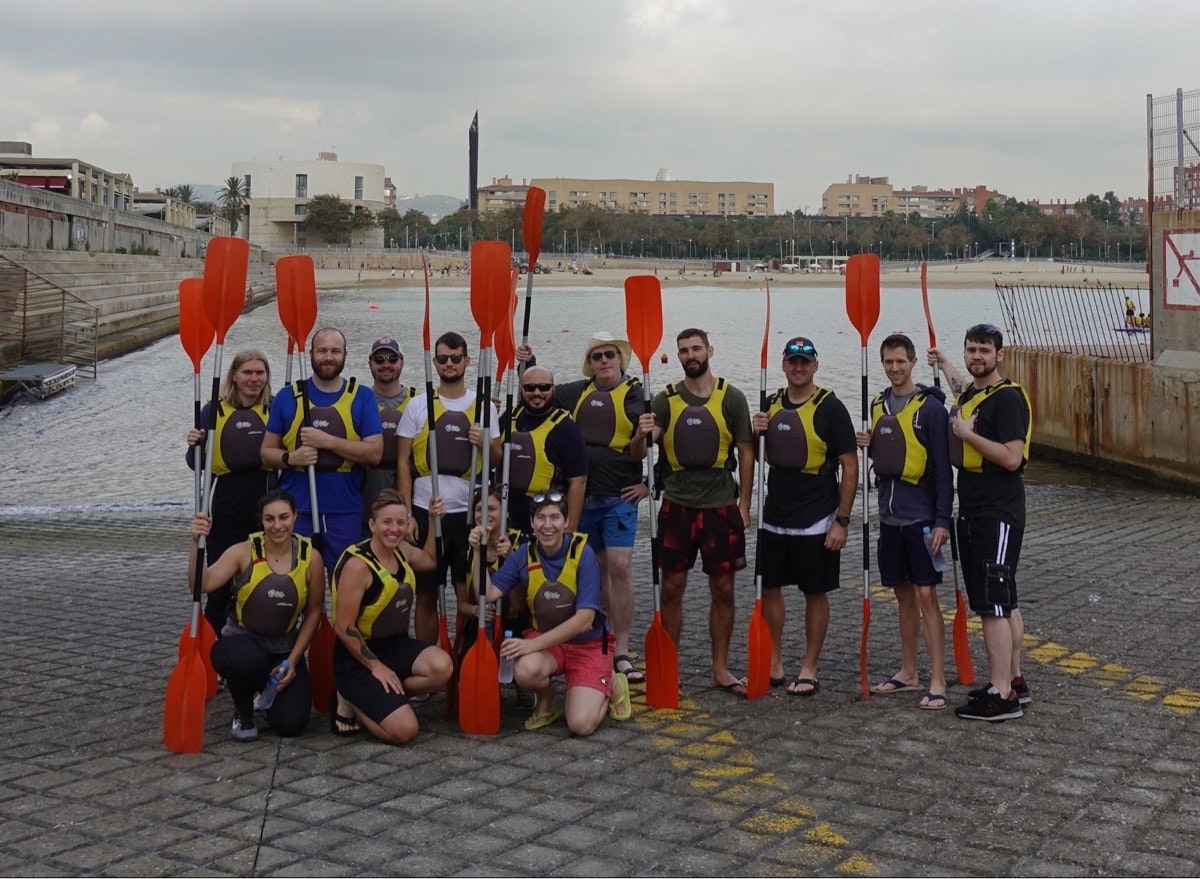
A crew of sea kayakers with their paddles during Help Scout’s 2017 retreat to Barcelona, Spain.
7. Explore a new city together on foot
Walking meetings make for better conversations and lead to deeper connections. We’ve gone to museums and on art walking tours, and we always manage to make time to stroll around without any particular aim.

8. … Or by bike
(Or even by Segway, if your team isn’t too cool for that kind of thing.)

Some Scouts set off on a bike tour of Lisbon, Portugal.
9. Make time for team time
It’s critical for each team to have dedicated opportunities to meet and plan for the future. For remote teams, this face-to-face time is even more important. Even if your company is co-located, dedicated team time is still an important opportunity to brainstorm outside the office in new surroundings to inspire new ideas.
10. … and cross-team time
We also try to carve out time for cross-functional collaboration — for example, the Product, Engineering and Design teams might all get together in a room to talk about the product roadmap; or the Marketing and Customers teams might talk about which kinds of companies we see signing up for Help Scout and how we might best communicate with them.
11. Share a meal
Breaking bread together is a great way to get to know your teammates. At least a couple evenings during the retreat, we break team members up into assigned, cross-team dinner groups to make sure people meet and mingle.

Teammates gather around the breakfast table during Help Scout’s Fall 2018 retreat to Hilton Head, SC.
12. … and a drink (if you want)
While we’ve scheduled everything from tequila tastings to brewery tours (and it’s common for teammates to grab a drink together after the day is done), make sure these activities are always optional and that non-drinkers have plenty of other fun activities to choose from!

A fancy tequila tasting held during Help Scout’s Spring 2016 retreat to Austin, Texas!
13. Dive deep
Before the retreat, we nominate a few folks to give 30-minute presentations on topics about which they’re deeply knowledgeable. These deep dives have covered everything from the art of negotiation, to how to have difficult conversations, to our rebrand. The talks teach us something new, and they shine a spotlight on team members in a special way that’s hard to reproduce once we’re back to our normal grind.
14. Break a sweat
After sitting in meeting rooms for a chunk of the day — especially when it’s nice outside! — it’s great to blow off steam on the court (or the golf course, or a climbing wall … whatever your team is into!)

A beach volleyball game at the Fall 2018 company retreat to Hilton Head, SC
15. Get your birds of a feather together
At Help Scout, we have dedicated Slack channels for different affinity groups — for example, women, LGBTQ+, people of color and so on. So at our company retreats, it’s great to organize time for those folks to see each other in person, build community and support one another.
16. Power through the queue
What happens to your customer support if the whole company is off frolicking in the Caribbean Sea? If you’re like us, then you turn tackling the support queue into a whole-company activity! We call it “Support Power Hour,” and we incorporate it into our retreat planning. We even dedicate a room to it and jump right in to help our customer team. Bottom line: Plan for customer support coverage during your company retreat and involve the whole company.

Support power hour during Help Scout’s 2017 company retreat in Barcelona.
17. Game on
Have any board game enthusiasts on your team? Invite people to pack their favorite games and reserve a room at your hotel for a game night!

Some gamers gather during our Spring, 2019 retreat to Lisbon, Portugal.
18. Break the ice
On the first or second day of the retreat, we like to have everyone participate in an icebreaker game — last time, we created Bingo-like cards that include personal facts like “speaks three or more languages” or “has a pet that isn’t a cat or a dog.” It’s a good way to stretch everyone’s legs and incite some interesting conversations! Culture Amp put together a good list of ideas for icebreaker games, if you need inspiration.
19. Get cooking
Taking a cooking class together is a fun (and delicious!) way to create something together and build camaraderie as a team.
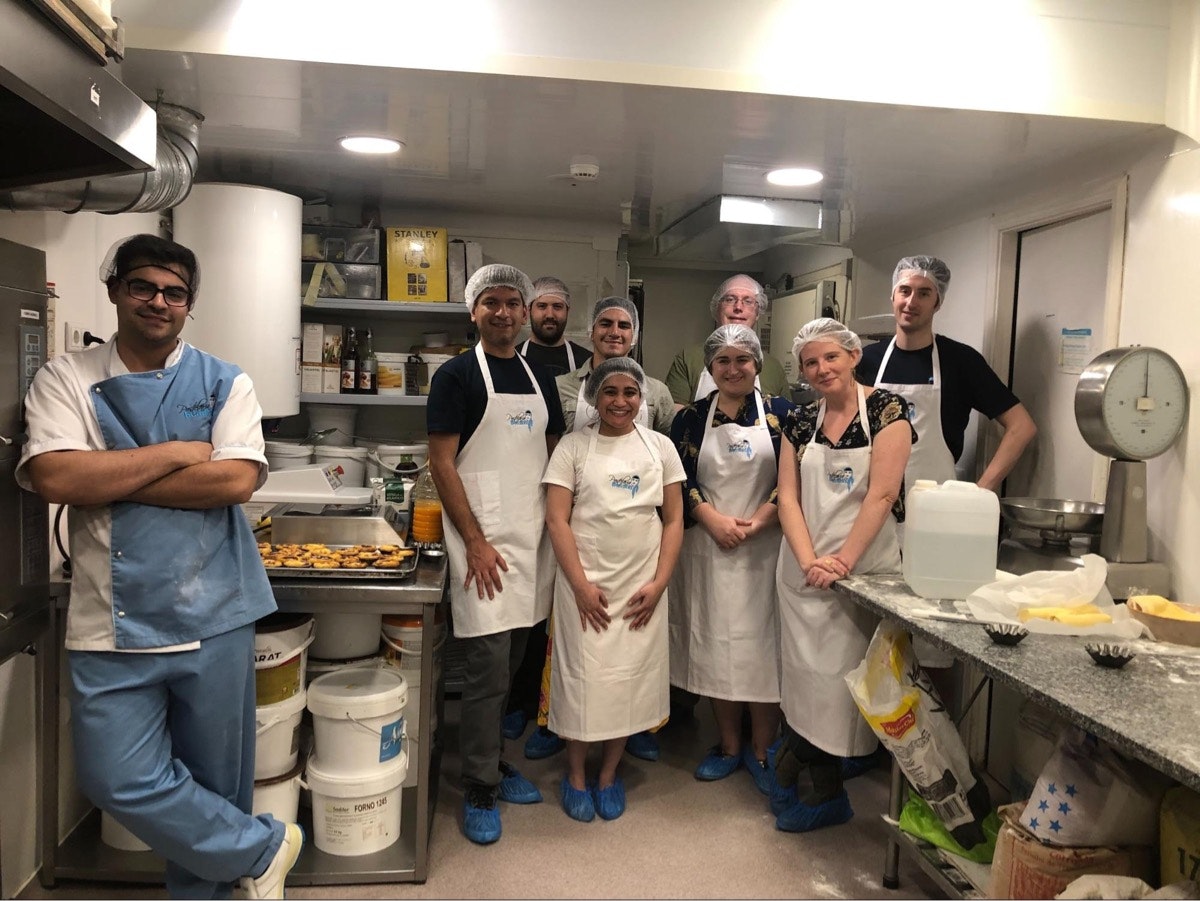
A group of Scouts takes a Pastel de Nata cooking class during the company retreat in Lisbon, Portugal.
20. Go on a “listening walk”
After a deep dive presentation about active listening in one retreat, we all paired up to go on a listening walk outside the hotel. The directions were to walk for 15 minutes, and take turns talking for seven minutes each about a time we received difficult feedback. The only talking the listener was allowed to do was to ask clarifying questions. It was an enlightening exercise and a great way to practice active listening before taking it back home and applying it to our work.
21. Have an adventure
Research the options available in the area ahead of time — are there challenge courses nearby? Ziplining? Snorkeling excursions? Scavenger hunts, escape rooms or other cooperative excursions? Airbnb’s Experiences platform is a good way to see what’s out there!
22. Get your nails did
Maybe a full day of pampering isn’t in the cards (or the budget), but a group outing to the nail salon can be a fabulous way to relax, socialize, and look and feel amazing!

The design team bonded over manicures during the Fall 2018 retreat to Hilton Head, SC.
23. Karaoke
During our first-ever retreat, a group stumbled upon a karaoke night. What could have been an awkward evening turned out to be both hilarious and endearing — not to mention we learned we have teammates with serious pipes! Now (for some of us, anyway … we know it’s not everyone’s bag!) karaoke has become a beloved part of our retreat ritual.
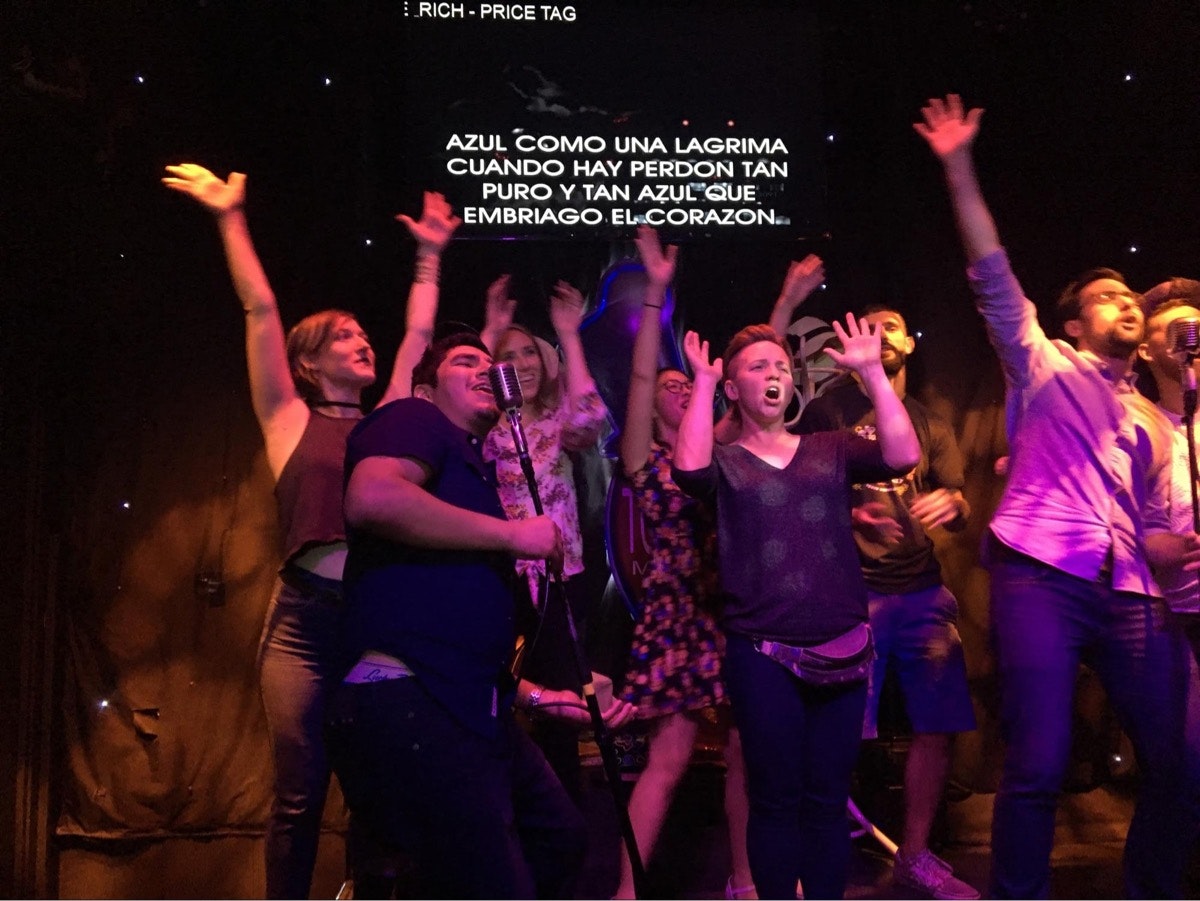
A calm, quiet evening with the team in Barcelona, Spain.
24. Share warm fuzzies
Like many companies, we have a dedicated channel in Slack where anyone can share a compliment about another teammate, work-related or otherwise — we call it #WarmFuzzy. The first time we shared warm fuzzies at the retreat, we did it open-mic style. That’s since evolved to asking people to write compliments for their team members on cards, then distribute those notes to the appropriate recipients. (It gives everyone a little more time to think and not feel put on the spot.) Many share sweet shoutouts to people not on their own teams, demonstrating just how effective a week of bonding has on cross-team culture.
25. Take photos
Since corporate retreats typically only happen once a year, it’s essential to document those moments to inspire your team throughout the year. But company retreats offer more than just adorable photo ops; getting your teammates out of the office and into a fun, new location brings out the spirit of your company! Genuinely happy people make great team photos and b-roll, and yes, great assets on any “About Us” page.
26. … and video
One of the best recruiting aces to have up your sleeve is to share a video that brings your company culture and energy to life. At our Fall 2018 retreat in Scottsdale, Ariz. we filmed this retreat video that we now host on our “About” page to share an insider look at our company and attract top talent:
27. Survey, rinse, repeat
We didn’t get to this formula alone. We survey the team after each retreat so we can continue what works and adjust what didn’t. For example, after an earlier retreat, we received feedback that folks wanted more scheduled “free time” for more organic bonding opportunities — our most recent retreats have struck a better balance.
Optionality is key
Even if you think you’ve figured out the most exciting activities under the sun, it’s important to remember there will always be a few people who might want to sit things out, and that’s okay! Spending every hour with 50+ other people, several days in a row, is certainly not everyone’s cup of tea. But the best retreats are ones with optionality; if you provide variety while allowing people to make their own choices, you’ll have happy teammates who feel rested and listened to.
Retreat tip: As with any activity you offer, make participation encouraged, but never mandatory.
Without thoughtful planning, company retreats have the potential to overwhelm and exhaust, leaving your valued teammates feeling annoyed and resentful. A successful retreat requires a schedule balanced with meaningful work time, a variety of activities, and plenty of free time. (Exquisite accommodations and good food don’t hurt, either.)
